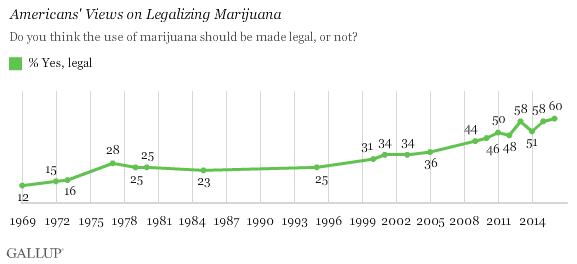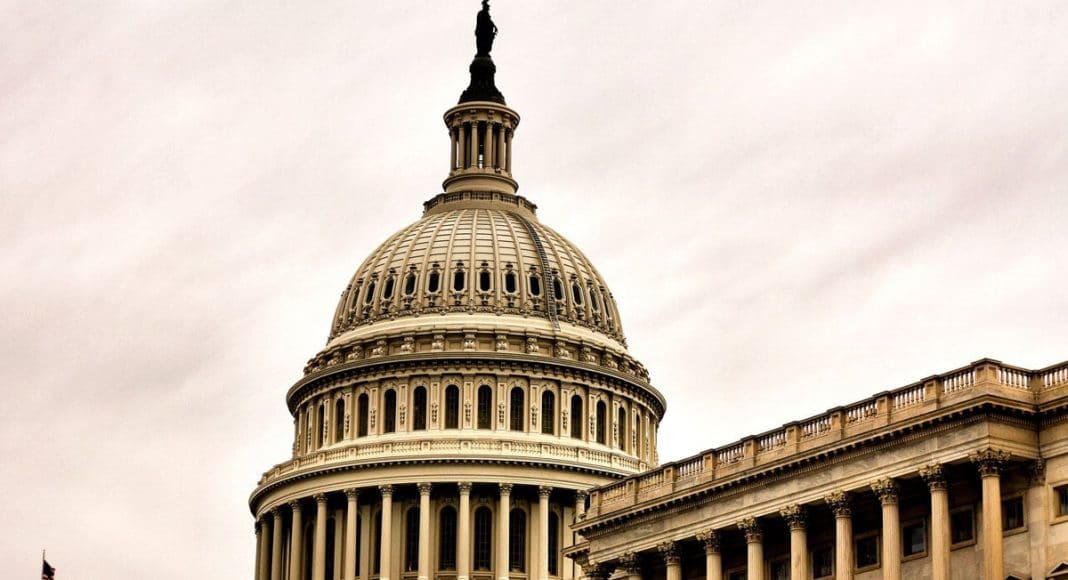A new Gallup poll shows record-breaking support for marijuana legalization, with 64 percent of Americans now in favor of marijuana legalization.
The number is the highest level of support in nearly half a century of surveying adults on the issue, according to Gallup, with a majority backing legalization across the political spectrum. 51% of Republicans, 72 percent of Democrats and 67 percent of independents are on board. Since 2012, voters in eight US states and the District of Columbia have approved legalization.
“Marijuana legalization is far more popular than Jeff Sessions or Donald Trump and will survive them both,” said Maria McFarland Sánchez-Moreno, executive director of the Drug Policy Alliance. “Instead of wasting limited law enforcement resources trying to stop successful state-level legalization initiatives, US officials should listen to the clear, bipartisan message the public is sending them, and support federal marijuana reform as well.”

By shifting away from counterproductive marijuana arrests and focusing instead on public health, states that have legalized marijuana are diminishing many of the worst harms of the war on drugs, while managing to raise substantial new revenues. A Drug Policy Alliance report found that Colorado, Washington, Alaska and Oregon have benefited from a dramatic decrease in marijuana arrests and convictions, as well as increased tax revenues, since the adult possession of marijuana became legal. At the same time, these states did not experience increases in youth marijuana use or traffic fatalities.
-
Related Story: A New National High: 45% Of Americans Have Tried Marijuana
In 2012, Colorado and Washington became the first two US states – and the first two jurisdictions in the world – to approve ending marijuana prohibition and legally regulating marijuana production, distribution and sales. In the 2014 election, Alaska and Oregon followed suit, while Washington DC passed a more limited measure that legalized possession and home cultivation of marijuana. In 2016, voters in California, Maine, Massachusetts and Nevada doubled the number of states that legally regulate marijuana, bringing the total to eight.
The most significant victory was California’s Proposition 64, which legalized the adult use of marijuana and enacted across-the-board retroactive sentencing reform for marijuana offenses, while establishing a comprehensive, strictly-controlled system to tax and regulate businesses to produce and distribute marijuana in a legal market. Its cutting edge provisions to undo the most egregious harms of marijuana prohibition on impacted communities of color and the environment, as well as its sensible approaches to public health, youth protection, licensing and revenue allocation, set a new gold standard for marijuana legalization.
-
Related Story: Why Marijuana’s Popularity Continues To Soar In America
Senator Cory Booker (D-NJ) recently introduced the Marijuana Justice Act, a bill modeled on Prop. 64 that ends federal marijuana prohibition and centers communities most devastated by the war on drugs.
“The question is no longer whether we should legalize marijuana, but rather how we should do it,” added McFarland Sánchez-Moreno. “The Marijuana Justice Act would legalize marijuana the right way, by not only stopping the ongoing harms of prohibition, but also beginning to address the devastation that marijuana prohibition has wrought, particularly among communities of color.”
This story first appeared on the Drug Policy Alliance website.


